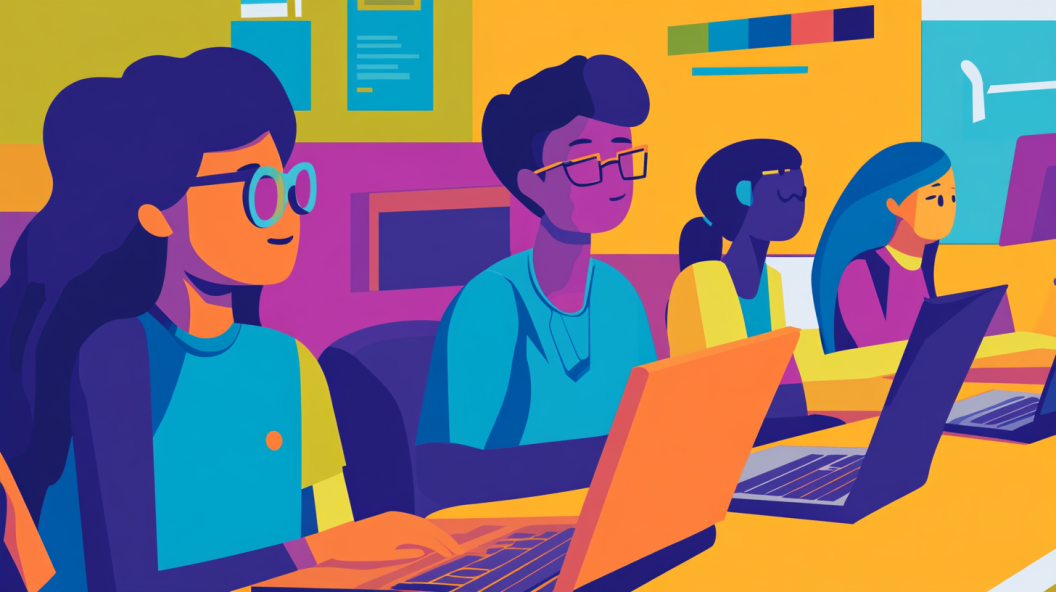The Benefits of Continuous Learning for Microsoft Experts

In the fast-paced tech industry, continuous learning stands as a beacon of growth and opportunity. As a Microsoft expert, you find yourself at the forefront of technological advancements. Staying updated is not just beneficial; it's essential. A staggering 94% of employees believe in the necessity of updating their skills to remain relevant. For Microsoft professionals, this means embracing new tools and innovations. Continuous learning not only enhances your expertise but also opens doors to career advancement and personal development. By committing to lifelong learning, you position yourself for success in an ever-evolving digital landscape.
Understanding Continuous Learning
Definition and Concept
What is Continuous Learning?
Continuous learning is your commitment to constantly acquiring new knowledge and skills. It involves a proactive approach to education, where you seek out opportunities to grow and evolve. In today's fast-paced world, this mindset helps you stay ahead of the curve. By embracing continuous learning, you ensure that your skills remain relevant and valuable.
Why is it Essential for Professionals?
For professionals like you, continuous learning is essential. It empowers you to adapt to changes and seize new opportunities. Research shows that lifelong learners often achieve greater career success. By continuously updating your skills, you position yourself for promotions and advancements. This approach not only enhances your expertise but also boosts your confidence and job satisfaction.
The Role of Continuous Learning in Technology
Keeping Up with Rapid Technological Changes
Technology evolves at lightning speed. As a Microsoft expert, you must keep pace with these changes. Continuous learning allows you to stay informed about the latest tools and innovations. By doing so, you maintain your competitive edge and ensure that you can effectively meet the demands of your role. This proactive approach helps you navigate the ever-changing tech landscape with ease.
Staying Competitive in the Job Market
In the job market, staying competitive is crucial. Continuous learning equips you with the skills needed to stand out. Employers value individuals who demonstrate a commitment to growth and adaptability. By engaging in ongoing education, you enhance your employability and open doors to new career paths. This dedication to learning sets you apart and positions you for long-term success.
Importance for Microsoft Experts
Evolving Microsoft Technologies
New Features and Updates
As a Microsoft expert, you witness the constant evolution of Microsoft technologies. New features and updates emerge regularly, transforming how you work and interact with technology. For instance, Microsoft 365 Copilot combines the power of large language models with your data in the Microsoft Graph. This tool turns your words into a powerful productivity asset, enabling you to create, summarize, and analyze with ease. By engaging in continuous learning, you stay informed about these advancements. This knowledge empowers you to leverage new tools effectively, enhancing your productivity and efficiency.
Integration with Other Technologies
Microsoft technologies do not exist in isolation. They integrate seamlessly with other platforms, creating a cohesive ecosystem. As a Microsoft expert, understanding these integrations is crucial. Continuous learning helps you grasp how Microsoft tools work alongside other technologies. This knowledge allows you to develop innovative solutions that meet diverse needs. By staying updated, you ensure that you can harness the full potential of Microsoft products, driving success in your projects and initiatives.
Enhancing Expertise and Credibility
Building a Strong Professional Reputation
Your expertise as a Microsoft professional sets you apart in the tech industry. Continuous learning plays a vital role in building and maintaining a strong professional reputation. By consistently updating your skills, you demonstrate a commitment to excellence. This dedication earns you respect and recognition from peers and employers alike. As you expand your knowledge, you become a trusted authority in your field, opening doors to new opportunities and collaborations.
Gaining Recognition in the Industry
Recognition in the tech industry often hinges on your ability to adapt and grow. Continuous learning positions you as a forward-thinking professional. By embracing new knowledge and skills, you gain visibility and credibility. This recognition can lead to career advancement and increased job satisfaction. As you engage in lifelong learning, you not only enhance your expertise but also inspire others to follow your lead. Your commitment to growth becomes a beacon of inspiration, encouraging others to pursue their own learning journeys.
Benefits of Continuous Learning

Skill Enhancement
Acquiring New Skills
Continuous learning empowers you to acquire new skills that are essential in today's dynamic tech landscape. As a Microsoft expert, you have the opportunity to explore a wide array of tools and technologies. This exploration not only broadens your skill set but also enhances your ability to tackle diverse challenges. By embracing continuous learning, you position yourself to adapt to new roles and responsibilities with ease. The tech industry values professionals who proactively seek knowledge and growth. Your commitment to learning new skills sets you apart as a forward-thinking individual ready to seize opportunities.
Improving Existing Skills
Continuous learning is not just about acquiring new skills; it also involves refining and improving the ones you already possess. As you engage in ongoing education, you deepen your understanding of Microsoft technologies. This deeper understanding translates into greater efficiency and effectiveness in your work. By honing your existing skills, you enhance your problem-solving abilities and boost your confidence. Continuous learning ensures that you remain at the top of your game, consistently delivering high-quality results. Your dedication to skill enhancement makes you an invaluable asset to any team or organization.
Career Advancement
Opportunities for Promotion
Continuous learning opens doors to exciting career advancement opportunities. By staying updated with the latest trends and technologies, you position yourself as a valuable candidate for promotions. Employers recognize and reward individuals who demonstrate a commitment to growth and development. A real-life success story is that of Sara, a marketing professional, who secured a promotion to a managerial role within one year through continuous learning. Her journey highlights the transformative impact of lifelong learning on career progression. By investing in your education, you pave the way for upward mobility and increased responsibilities.
Increased Job Satisfaction
Engaging in continuous learning not only advances your career but also enhances your job satisfaction. As you acquire new skills and improve existing ones, you gain a sense of accomplishment and fulfillment. This sense of achievement boosts your confidence and motivation, leading to greater job satisfaction. Continuous learning fosters a growth mindset, encouraging you to embrace challenges and view them as opportunities for development. By continuously evolving, you find joy in your work and inspire others to do the same. Your dedication to learning becomes a source of inspiration, driving you toward long-lasting career success.
Strategies for Continuous Learning
Formal Education and Certifications
Enrolling in Courses
To thrive as a Microsoft expert, you should consider enrolling in courses. These courses offer structured learning paths that deepen your understanding of Microsoft technologies. By participating in these programs, you gain access to expert knowledge and practical skills. This approach ensures you stay ahead in the ever-evolving tech landscape.
Obtaining Microsoft Certifications
Microsoft certifications validate your expertise and commitment to continuous learning. They provide a clear path to mastering specific skills and technologies. Microsoft Certified Trainers emphasize the importance of exam readiness, offering resources that boost your chances of success. Achieving these certifications not only enhances your credibility but also opens doors to career advancement. Microsoft certifications validate your expertise.
Informal Learning Methods
Online Resources and Tutorials
The internet is a treasure trove of learning opportunities. Online resources and tutorials allow you to learn at your own pace. Platforms like Microsoft Learn offer a wealth of information, from beginner guides to advanced tutorials. By exploring these resources, you can continuously update your skills and knowledge.
Networking and Community Engagement
Engaging with the Microsoft community is a powerful way to enhance your learning journey. Networking with peers and experts provides insights and support. Participating in forums, attending webinars, and joining user groups foster a collaborative learning environment. This engagement not only enriches your understanding but also inspires you to pursue new learning paths.
Practical Implementations

Setting Learning Goals
Setting clear learning goals is the first step in your journey of continuous learning. It helps you focus on what you want to achieve and how you plan to get there.
Identifying Areas for Improvement
Start by identifying areas where you can improve. Reflect on your current skills and knowledge. Ask yourself questions like, "What skills do I need to advance in my career?" or "Where do I see gaps in my expertise?" This self-assessment will guide you in pinpointing the specific areas that require attention. By understanding your strengths and weaknesses, you can tailor your learning efforts to address these gaps effectively.
Creating a Learning Plan
Once you've identified your areas for improvement, create a learning plan. This plan should outline the steps you need to take to achieve your goals. Break down your objectives into manageable tasks. Set deadlines for each task to keep yourself accountable. A well-structured learning plan acts as a roadmap, guiding you through your continuous learning journey. It ensures that you stay on track and make consistent progress toward your goals.
Balancing Learning with Work
Balancing learning with work can be challenging, but it's essential for your growth and development. With effective strategies, you can manage both aspects successfully.
Time Management Techniques
Effective time management is crucial when balancing learning with work. Prioritize your tasks and allocate specific time slots for learning activities. Use tools like calendars or planners to schedule your study sessions. Consider techniques like the Pomodoro Technique, which involves focused work sessions followed by short breaks. This approach helps maintain your concentration and prevents burnout. By managing your time wisely, you can ensure that learning becomes an integral part of your routine without overwhelming your work commitments.
Prioritizing Learning Activities
Prioritizing learning activities is key to making the most of your continuous learning journey. Focus on high-impact activities that align with your goals. For instance, if you're aiming to master a new Microsoft technology, prioritize courses or resources that provide in-depth knowledge on that topic. Avoid spreading yourself too thin by trying to learn everything at once. Instead, concentrate on a few key areas that will have the most significant impact on your career. By prioritizing effectively, you can maximize the benefits of your learning efforts and achieve meaningful progress.
Organizational Support for Continuous Learning
Encouraging a Learning Culture
Creating a culture that values learning is essential for your growth and success. Organizations that prioritize continuous learning often see remarkable benefits. They attract and retain top talent, drive business success, and adapt to changes with ease. You can thrive in such an environment by embracing the resources and opportunities provided.
Providing Learning Resources
To support your learning journey, organizations should offer a variety of resources. Access to online courses, workshops, and training materials can significantly enhance your skills. These resources empower you to explore new areas and deepen your expertise. By utilizing these tools, you can stay ahead in your field and continuously improve your capabilities.
Recognizing and Rewarding Learning Efforts
Recognition plays a crucial role in motivating you to pursue continuous learning. When organizations acknowledge your efforts, it boosts your morale and encourages further growth. Rewards, such as promotions or bonuses, can serve as powerful incentives. By valuing your commitment to learning, organizations foster a positive environment where you feel inspired to excel.
Aligning Learning with Business Goals
Aligning your learning objectives with organizational goals ensures that your efforts contribute to overall success. This alignment helps you focus on acquiring skills that are relevant and valuable to your role. It also enhances your ability to make meaningful contributions to the organization.
Identifying Skill Gaps
Identifying skill gaps is the first step in aligning learning with business goals. Organizations should conduct regular assessments to determine areas where you and your colleagues can improve. By understanding these gaps, you can tailor your learning efforts to address specific needs. This targeted approach ensures that your skills remain aligned with evolving job requirements.
Developing Training Programs
Developing comprehensive training programs is essential for bridging skill gaps. These programs should be designed to equip you with the knowledge and skills needed to excel in your role. By participating in structured training, you can enhance your expertise and adapt to changing demands. Organizations that invest in training programs demonstrate a commitment to your growth and development, setting the stage for long-term success.
Challenges and Solutions
Overcoming Barriers to Learning
Addressing Time Constraints
You often face time constraints when trying to learn new skills. Balancing work, personal life, and learning can feel overwhelming. To tackle this, prioritize your learning activities. Break down your learning goals into smaller, manageable tasks. Allocate specific time slots for these tasks in your daily schedule. This approach helps you make steady progress without feeling rushed. Remember, consistency is key. Even dedicating a small amount of time each day can lead to significant improvements over time.
Managing Learning Fatigue
Learning fatigue can hinder your progress. You might feel exhausted after long study sessions. To combat this, incorporate breaks into your learning routine. Use techniques like the Pomodoro Technique, which involves focused study periods followed by short breaks. This method helps maintain your concentration and prevents burnout. Additionally, vary your learning activities to keep things interesting. Mix reading with hands-on practice or discussions with peers. This variety keeps your mind engaged and reduces fatigue.
Sustaining Motivation
Setting Achievable Milestones
Setting achievable milestones keeps you motivated on your learning journey. Break your larger goals into smaller, attainable steps. Celebrate each milestone you reach. This sense of accomplishment boosts your confidence and encourages you to keep going. For example, if you're learning a new Microsoft technology, set a goal to complete a specific module within a week. Once you achieve it, reward yourself. These small victories build momentum and drive you toward your ultimate goal.
Celebrating Learning Successes
Celebrating your learning successes is crucial for maintaining motivation. Acknowledge your progress and achievements, no matter how small. Share your successes with others. This not only boosts your morale but also inspires those around you. Consider the story of Alex, a student with dyslexia who faced academic challenges. Through perseverance and tailored learning strategies, Alex overcame these obstacles. His journey highlights the power of celebrating each step forward. By recognizing your achievements, you reinforce your commitment to continuous learning and inspire others to do the same.
Continuous learning offers you numerous benefits as a Microsoft expert. It enhances your skills, boosts your career, and keeps you competitive. Embrace lifelong learning to unlock new opportunities and achieve long-term success. Consider the story of Sara, who advanced to a managerial role through dedicated upskilling. Her journey highlights the transformative power of continuous learning. By integrating learning into your daily routine, you not only grow professionally but also inspire others. Remember, every step you take in learning shapes your future and opens doors to endless possibilities.
See Also
Advantages of Employing Microsoft-Certified Experts
Navigating the Path to Becoming a Microsoft Specialist
Maximizing Microsoft Certifications for Career Growth
Key Certifications for Microsoft Experts in 2024
Desired Qualities of Microsoft Professionals in a New Position
